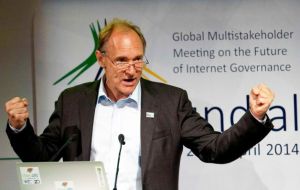MercoPress. South Atlantic News Agency
Brazil sets the path for the future of a free, open and transparent internet
 President Rousseff at the opening of the NETMundial conference in Sao Paulo
President Rousseff at the opening of the NETMundial conference in Sao Paulo Brazilian President Dilma Rousseff said at the Wednesday opening of a gathering in Sao Paulo that no country can have “more weight than another” in governing cyberspace. Delegations from more than 85 countries are attending the NETMundial international conference which during two days will debate Internet issues and try to reach an agreement on a new oversight model.
The push to reformulate Internet governance gained momentum in Brazil after documents leaked by former intelligence contractor Edward Snowden showed the U.S. National Security Agency had spied on the phone calls and e-mails of Brazilian citizens and companies and the president herself.
In her speech Wednesday, Rousseff railed against “unacceptable” U.S. espionage and said the monitoring of communications runs counter to the Internet's essence as a “plural, open and free” medium of communication.
“This meeting is in response to a global desire for changes to the current situation and the systematic strengthening of freedom of expression and the protection of basic human rights, including the right to privacy,” Rousseff said.
During the event's inauguration, the president hailed the United States' recent decision to relinquish its oversight of ICANN, a Los Angeles-based non-profit organization that assigns Internet domain names or addresses.
”From now on the new institutional and legal accord (governing) the system of Internet domain names must be constructed with the broad participation of all interested sectors, and not only the traditional actors,“ the president said.
She also stressed the importance of reaching an agreement on ”multi-sector, multilateral, democratic and transparent“ Internet governance, a call backed by British scientist Tim Berners-Lee, the ”father of the World Wide Web,“ who was in attendance at the event's inauguration.
Berners-Lee said the Web-based innovation achieved in recent years has been possible thanks in large part to net neutrality, a central component of a new Internet privacy law that Rousseff signed on Wednesday before opening the conference.
The legislation, which was passed by the Senate late Tuesday, puts limits on the metadata that can be collected from Internet users in Brazil. It also makes Internet service providers not liable for content published by their users and requires them to comply with court orders to remove offensive material.
Rousseff had championed a measure requiring Internet companies to store the data of Brazilian users inside the country, as a way of protecting citizens from further US spying, but the clause was cut from the final bill amid fears it would prove too challenging to implement.
The Brazilian leader praised Congress for passing the legislation, which she said ”guarantees the neutrality of the Web, which is fundamental to maintaining the Internet's free and open nature.“
”Our legislation can influence the worldwide debate aimed at finding a way to guarantee real rights in a virtual world,” Rousseff's official blog quoted her as saying.
The new law promotes privacy by limiting the data that online companies can collect on Internet users in this nation of 200 million people, deeming communications over the Internet “inviolable and secret.” Service providers must develop protocols to ensure email can be read only by senders and their intended recipients. Violators are subject to penalties including fines and suspension.
The law obliges Internet companies, however, to hold on to user data for six months and hand it over to law enforcement under court order.
Net neutrality advocates say the Internet should be treated as a public utility, especially as consolidation in the telecommunications business reduces the number of providers so that many operate as near monopolies.
The Brazilian law’s enactment follows the overwhelming passage earlier this month by the European Parliament of a net neutrality bill.
Other countries that have net neutrality laws include Netherlands and Chile, which was the first to do so in 2010. In the United States, net neutrality rules imposed by the Federal Communications Commission were struck down by a court in January. The following month, movie-streamer Netflix struck a deal with Comcast to pay for preferential treatment of Internet traffic bearing its film streams.
As the Internet has expanded to mobile devices, telecoms without “net neutrality” can reserve better network performance for services that they themselves sell or reserve big chunks of bandwidth for a company such as Netflix.
“I believe that neutrality, privacy, freedom and the absence of discrimination guaranteed in the text are really going to put Brazil in the vanguard as a model for various other countries,” Interior Minister Jose Eduardo Cardozo was quoted as saying on Rousseff’s blog.





Top Comments
Disclaimer & comment rules-

-

-

Read all commentsIf it comes to a choice of an internet that is governed by countries such as China and Russia and Brazil; then I'll choose the one that isn't.
Apr 24th, 2014 - 03:50 am 0If the internet split in two, I know which one would continue to grow and attact people from every country..... and it won't be the one which has a committee of governments running it.
What if there was a Special UN Committee like the C24 running the internet? You don't think that would work?
Apr 24th, 2014 - 04:10 am 0This is in contrast to the US. Its looking like the FCC is going to cave.
Apr 24th, 2014 - 06:09 am 0Commenting for this story is now closed.
If you have a Facebook account, become a fan and comment on our Facebook Page!